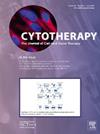从供体到治疗:强大的制造如何塑造供体来源的异体体外扩增和活化γδ T细胞产品的TCR库和细胞毒性
IF 3.7
3区 医学
Q2 BIOTECHNOLOGY & APPLIED MICROBIOLOGY
引用次数: 0
摘要
背景,γ - δ (γδ) T细胞水平已被证明与肿瘤预后呈正相关。(γδ) T细胞不启动GvHD,并通过多种先天配体杀死癌症。一项临床试验(NCT03533816)正在研究单次输注供体来源的异体体外扩增和活化的γδ T细胞(EAGD)是否能改善接受单倍体BMT的白血病患者的预后。γδ T细胞的制造可能需要长时间的加工。10天。为了了解对制造细胞的影响,分析了起始材料和最终产品,以确定细胞激活,效力和功能的变化。本研究包括分析INB-100 i期试验中使用的EAGD产品子集,这些产品使用专有协议从供体中制造。分析起始材料和最终输注临床产品的TCR库和基因表达。结果TCR表达库由αβ-TCR向γδ-TCR转移,且v - γ - 9克隆优先扩增。αβ-TCR克隆多样性显著降低,p <;0.01,而γδ-TCR多样性保持相似。基因表达分析显示,细胞毒性的细胞标记物(如。INFG, GZMB, PRF1),激活和免疫细胞运输/刺激。不同产品的表达谱是一致的,证明了制造的稳健性和可重复性。最初的队列已完全入组,目前正在积极招募最多15名患者,并在剂量水平2(推荐的2期剂量(RP2D))进行治疗。在最初的10例患者队列中,所有患者在一年内没有复发,截至2024年1月17日,没有AML患者复发,中位OS为23.3,具有可控的安全性。值得注意的是,观察到循环γδ T细胞的扩增和持续长达1年,这表明γδ T细胞效应物的持久性延长。结论:该技术可产生具有相似基因表达转移的γδ T细胞产品。临床产品在基因表达水平上表现出细胞毒性、免疫招募和组织运输能力。与HaploCy BMT的1年无复发生存率(约50%)相比,输注EAGD产品的受试者显示出持久的无复发生存,这表明他们在移植后使用γ - δ T细胞可能改善了预后。本文章由计算机程序翻译,如有差异,请以英文原文为准。
From Donor to Therapy: How Robust Manufacturing Shapes the TCR repertoire and Cytotoxic Power of Donor-Derived Allogeneic ex vivo Expanded and Activated γδ T Cell Products
Background & Aim
Gamma-delta (γδ) T cell levels have been shown to positively correlate with Oncology outcomes. (γδ) T cells do not initiate GvHD and kill cancer via multiple innate ligands. A clinical trial (NCT03533816) is examining if a single infusion of donor-derived allogeneic ex vivo expanded and activated γδ T cells (EAGD) improves outcomes for leukemia patients undergoing haploidentical BMT with reduced intensity conditioning. The manufacturing for γδ T cells may require long processing > 10 days. To understand the impact on the manufactured cells, the starting material and final product were analyzed to identify changes in cell activation, potency and function.
Methodology
This study includes analysis of a subset of EAGD products used in the INB-100 Phase 1 trial, manufactured from donors using a proprietary protocol. The starting material and final infused clinical product were analyzed for TCR repertoire and gene expression.
Results
The manufacturing shifted the TCR repertoire from αβ-TCR to γδ-TCR expression, with preferential expansion of Vγ9 clones. The diversity of αβ-TCR clones was significantly reduced, p < 0.01, in the final product, while γδ-TCR diversity remained similar. Gene expression analysis revealed consistent upregulation of cellular markers of cytotoxicity (eg. INFG, GZMB, PRF1), activation, and immune cell trafficking/stimulation. Expression profiles were consistent across products, demonstrating robustness and reproducibility of the manufacturing.
The initial cohorts are fully enrolled, an expansion of up to 15 additional patients is being actively recruited and treated at dose level 2, the recommended phase 2 dose (RP2D). All patients in the initial 10 patient cohort passed one year without relapse, to-date no AML patients have relapsed with median OS of 23.3 as of Jan 17, 2024, with a manageable safety profile. Notably, circulating γδ T cell expansion and persistence of up to 1 year was observed, suggesting prolonged γδ T cell effector durability.
Conclusion
The proprietary manufacturing generates consistent robust and cytotoxic γδ T cell products with similar gene expression shifts from different donors. The clinical products exhibit, at the gene expression level, cytotoxicity, immune recruitment, and tissue trafficking capabilities. Subjects infused with EAGD product show durable relapse-free survival, comparing favorably with the ∼50% expected 1-year relapse-free survival for HaploCy BMT, suggesting they may have improved outcomes with gamma-delta T cells post-transplant.
求助全文
通过发布文献求助,成功后即可免费获取论文全文。
去求助
来源期刊

Cytotherapy
医学-生物工程与应用微生物
CiteScore
6.30
自引率
4.40%
发文量
683
审稿时长
49 days
期刊介绍:
The journal brings readers the latest developments in the fast moving field of cellular therapy in man. This includes cell therapy for cancer, immune disorders, inherited diseases, tissue repair and regenerative medicine. The journal covers the science, translational development and treatment with variety of cell types including hematopoietic stem cells, immune cells (dendritic cells, NK, cells, T cells, antigen presenting cells) mesenchymal stromal cells, adipose cells, nerve, muscle, vascular and endothelial cells, and induced pluripotential stem cells. We also welcome manuscripts on subcellular derivatives such as exosomes. A specific focus is on translational research that brings cell therapy to the clinic. Cytotherapy publishes original papers, reviews, position papers editorials, commentaries and letters to the editor. We welcome "Protocols in Cytotherapy" bringing standard operating procedure for production specific cell types for clinical use within the reach of the readership.
 求助内容:
求助内容: 应助结果提醒方式:
应助结果提醒方式:


